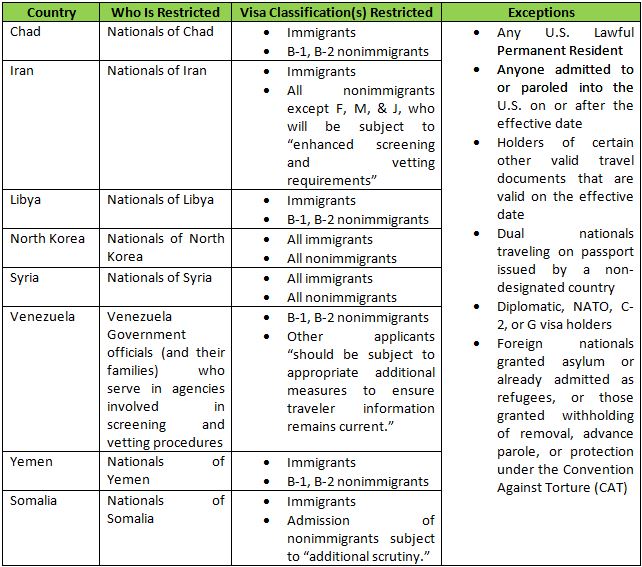On Monday, November 13th, the Ninth Circuit Court of Appeals issued an order staying in part and upholding in part a preliminary injunction imposed on the Trump Administration’s latest travel ban by the Federal District Court in Hawaii. The nationwide injunction against enforcement of the ban had previously prevented the Trump Administration’s enforcement of the ban against nationals of six majority-Muslim countries named in the ban. The injunction is now lifted and can be enforced, except with respect to those who have “a bona fide relationship with a person or entity in the United States,” an exception which was carved out by the U.S. Supreme Court in litigation regarding the initial travel ban.
The latest version of the travel ban was announced by a proclamation, “Enhancing Vetting Capabilities and Processes for Detecting Attempted Entry into the United States by Terrorists or Other Public-Safety Threats.” The proclamation expanded and extended the President’s previous “travel ban” just as it was expiring pursuant to court order issued under pending litigation challenging the ban, as reported in previous Foster Immigration Updates.©
Who Is Impacted?
The proclamation, which can now be enforced as indicated in the chart below, with the additional exception of those with a bona fide relationship to a person or entity in the United States. A bona fide family relationship includes relationships with parents, children, siblings, grandparents, grandchildren, siblings-in-law, aunts, uncles, nieces, nephews, and cousins. Bona fide relationships with an entity may qualify so long as they were established in the normal course of business and not for the purpose of evading the travel ban. Examples of qualifying relationships with entities in the United States include speaking engagements with or enrollment in U.S. universities or job offers with U.S. employers. Other types of relationships and engagements may also qualify so long as they are established in the normal course of business.
Scope of Restrictions and Possible Waivers
The proclamation generally applies to foreign nationals referenced above who are outside the United States on the effective date and do not have a valid visa on the effective date. Those who are impacted and do not fall under one of the exceptions may apply for a waiver. The proclamation directs the Secretaries of State and Homeland Security to “coordinate to adopt guidance addressing the circumstances in which waivers may be appropriate for foreign nationals seeking entry as immigrants or nonimmigrants.”
Waivers may be granted “only if a foreign national demonstrates to the consular officer’s or CBP official’s satisfaction” each of the following elements:
- Denying entry would cause the foreign national undue hardship;
- Entry would not pose a threat to the national’s security or public safety of the United States; and
- Entry would be in the national interest.
Individuals who secure a waiver must still demonstrate eligibility according to all other requirements of the requested visa category.
Effective Date
For individuals subject to the previous travel ban, the effective date of the proclamation would have been September 24th, had it not been for the injunction that has now been lifted. For all other individuals, the effective date of the ban would have been October 18, 2017. The restrictions are in place indefinitely, though the proclamation provides that countries may be removed from the list upon meeting certain criteria listed in the proclamation with respect to “identity-management information”, “national security and public-safety information”, and “national security and public-safety risk assessment.”
Case-by-Case Consultations Recommended
The proclamation allows for case-by-case waivers and provides examples of circumstances wherein a waiver may be appropriate, though categorical waivers are disallowed. For a consultation to evaluate the applicability of the new travel restrictions to a particular applicant, or the potential availability of a waiver, contact your Foster LLP immigration attorney. Foster LLP will continue to monitor the introduction and implementation of travel restrictions, and the availability of potential waivers, and will make new information available as appropriate in future Immigration Updates© and on our firm’s website at www.fosterglobal.com.

